Picture this: you started a new job while studying at school, work overtime, and have a crucial exam to study for. With all this work, stress, and pressure on the weight of your shoulders, at any moment you could collapse and BURN OUT.
Eliminating burnout is nearly impossible, but preventing burning out is more than practicable. Knowing your limits and not volunteering to take on more responsibilities than you can handle can help you avoid feeling burnout. This way you can handle both your school life and your social life. It may feel like you are lacking in one department, but if you keep piling on the workload you will eventually give up and begin to realize that it was too much pressure to manage. Many teens feel this pressure to excel in school and socially. This is a lot to handle, so just know that you are not alone.
Burning out can happen after putting too much pressure on yourself and can be characterized by giving up or losing interest when it gets too much. This has become so common that more than 75 percent of teens experience burnout.
Here are some symptoms of burnout:
- Physical Symptoms
- Feeling tired and drained most of the time.
- Change in appetite or sleep habits.
- Lowered immunity, frequent illnesses
- Emotional Symptoms
- Sense of failure and self-doubt
- Feeling helpless, trapped, and defeated
- Detachment and feeling alone
Possible causes of school burnout can include:
- Lack of Control
- Workload
- Unclear Job Expectations
- School-life imbalance
- Dysfunctional school dynamic
Suggested Coping Strategies for Preventing Burnout:
- Make time for the activities you enjoy that help you destress
- Go on daily or weekly walks outside
- Develop a good relationship with your teachers so you can explain the stress you’re feeling
- Get better at managing time ( I know this may be hard but once you understand how to spread your workload throughout the week you will feel less stressed
- Organize school work, activities, and extracurricular at the beginning of the week so you have a clear view of how to manage your time
Tips for Recovering from Burnout:
- Seek help from friends and trusted adults
- Do NOT ignore your symptoms
- Decide where you can make a change in your schedule so you will have more time for yourself to recoup
- Have a Self-Care day
In the beginning, realizing you are burning out may be hard to detect. By focusing on your priorities first, you will understand that putting too much pressure on yourself will not make you better than anybody else. Remember that you control your surroundings and that it will only get better from the situation you’re enduring.






